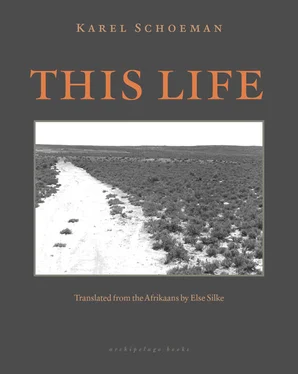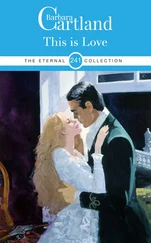Karel Schoeman - This Life
Здесь есть возможность читать онлайн «Karel Schoeman - This Life» весь текст электронной книги совершенно бесплатно (целиком полную версию без сокращений). В некоторых случаях можно слушать аудио, скачать через торрент в формате fb2 и присутствует краткое содержание. Год выпуска: 2015, ISBN: 2015, Издательство: Archipelago, Жанр: Современная проза, на английском языке. Описание произведения, (предисловие) а так же отзывы посетителей доступны на портале библиотеки ЛибКат.
- Название:This Life
- Автор:
- Издательство:Archipelago
- Жанр:
- Год:2015
- ISBN:978-0-914671-16-9
- Рейтинг книги:5 / 5. Голосов: 1
-
Избранное:Добавить в избранное
- Отзывы:
-
Ваша оценка:
- 100
- 1
- 2
- 3
- 4
- 5
This Life: краткое содержание, описание и аннотация
Предлагаем к чтению аннотацию, описание, краткое содержание или предисловие (зависит от того, что написал сам автор книги «This Life»). Если вы не нашли необходимую информацию о книге — напишите в комментариях, мы постараемся отыскать её.
considers both the past and future of the Afrikaner people through four generations of one family. In an elegiac narrator's tone, there is also a sense of compulsion in the narrator's attempts to understand the past and achieve reconciliation in the present. This Life is a powerful story partly of suffering and partly of reflection.
This Life — читать онлайн бесплатно полную книгу (весь текст) целиком
Ниже представлен текст книги, разбитый по страницам. Система сохранения места последней прочитанной страницы, позволяет с удобством читать онлайн бесплатно книгу «This Life», без необходимости каждый раз заново искать на чём Вы остановились. Поставьте закладку, и сможете в любой момент перейти на страницу, на которой закончили чтение.
Интервал:
Закладка:
The discord, the angry conferences in the voorhuis and the rows with the church council continued, however, and after four years Mr Van der Merwe received his demission. Mr Reyneke, who succeeded him, was a more cautious and more flexible young man, and he and his wife called on Mother regularly and showed suitable respect for her position, so that she developed a liking for them. Gradually the serious rift in the congregation was mended; but until the very end of her life, when it was no longer possible for her to leave her room or even her bed, Mother retained her honorary seat in church, the black-clad figure increasingly gaunt, but the back as straight as ever. In those years she ordered from Worcester a cape, embroidered with glittering jet, which caused a mild sensation and to which the women of the congregation reacted with spite: such a display of elegance did not suit her, and she was not really comfortable with it herself, but for years she wore that embroidered cape to church every Sunday, glittering among the paler women.
Could it really have been ten years? I looked after the house-keeping and supervised in the house, baked bread and counted the washing when it came back from the fountain at Ouplaas, and tried to protect the paltry flower-beds from frost and drought; I filled the paraffin lamps that were used in the voorhuis and dining-room, and in the evenings drew the curtains against the dark; I followed Mother to church on Sundays and took my seat at the back, close to the door, while she moved among the pews in her glittering jet to claim her honorary seat in front of the pulpit — a good daughter, a model daughter; a blessing in the house. To others it must have seemed a tedious and lonely life, but I never saw it that way myself, for I had learned to distance myself from appearances and to be unaffected by the restrictions of my existence. After church the women addressed me kindly and when I passed them on my way to the store as they stood talking in front of their houses, they graciously tried to include me in their conversations, but I was unfamiliar with most of the matters they were discussing and there were also many things they did their best to withhold from me. Their goodwill was not unlimited, however: sooner or later they lost patience and gave up on their efforts and their verdict was probably the same as Stienie’s. Well, you must understand, Tantetjie has always been a little strange; and the bright sunlight falling through the net curtain is diffused, so that the room where I stand alone seems gloomy and mysterious.
I am standing at the window and under my fingers I feel the smooth, straight edge of the splashboard — no, not like that, not that. I am standing at the window … What memory comes back so vividly now? It was a different evening; for a moment I feel the window-pane smooth and cool under my fingers before I draw the curtain, and for a moment I linger, because outside in the twilight I see something stirring, a figure at the gate, fumbling for the catch. Must I remember, must I go on to remember what has been forgotten for so long without making the slightest difference? I have been trying to sleep, and because I cannot sleep, my thoughts have been set in motion here where I lie alone, speechless and paralysed in the dark of the sleeping house; I did not want to remember anything, it was never my intention to call up the past and to call up figures in the half-light, to have phantoms step out into the light where their features would be recognisable again. Where does Abraham van Wyk come from now, striding out of the past, out of the dark night to stand at our front door once again, his eyes blinking in the light of the candle I hold in my hand? There was no reason for him to visit us that evening, but neither was there any reason for such a visit to seem strange, for he was an old acquaintance, always somewhere in the background over the years with his bashful smile, his sparse beard and dry cough. His wife had died and there were no children, and now he was suddenly standing at our door without us even being aware that he was in town.
I lit the lamp in the voorhuis, for when we were alone we usually sat by candlelight until we went to bed, and made coffee and took it in, and then I carried on with my chores while Abraham discussed his affairs with Mother. What did I actually know, I who was nearly forty years old? I was never told anything, nothing was ever explained to me and no reasons were ever supplied; I continued with my work without asking questions or expecting explanations and I considered it natural that questions, explanations, feelings remained unspoken, and knowledge was accumulated along other ways, in the form of deductions, suspicions or incidental observations, a few words in the passage, a flash through the chink of a door, a hazy figure in the gloom behind the net curtain. He took his leave of Mother and departed and I accompanied him to the door with a candle; he muttered a few words of farewell and walked to the gate in the dark, and I shut the door behind him.
What did I know after all? Thus I was completely unprepared for the outburst that engulfed me when I returned to Mother in the voorhuis, and it took a while before I understood the gist of those knife-sharp words and realised that her scorn and outrage were directed at Abraham; accustomed as I was to the vehemence of her hostilities and feuds, it took me even longer to realise that this time I was involved too. A loser with a stand barely big enough to keep a handful of sheep alive, a no-hoper who in a million years would not be able to pay off his debts at the store, a weakling who would never even be elected as deacon — Father would have laughed in his face, she declared, trembling with barely contained outrage and fury; Father would have driven him from the house before he had even finished speaking. I listened silently to the biting words without interrupting, for since childhood I had learned to let her attacks of almost demented fury wash over me, and it was only when she began to prepare for evening prayers and bed, still seething with fury and stuttering over the prayer, that I realised, dazed, that it had been for my sake that Abraham had come that evening.
I remember lying awake for a long time that night, quite astonished, trying to take in the events. Father would not have laughed at him, that I knew, nor would he have driven him away: Father’s heart had been too kind and loving for that and as far as Abraham was concerned, he may not have been wealthy, but he was a decent and well-respected man who had nothing to be ashamed of. That this unassuming widower wanted to court me, surprised me, but I considered the fact without the rush of panic I had felt when old Tant Mietjie had sent Jasper across the dance floor: instead, the knowledge moved me in a strange way, and I felt a kind of gratitude towards Abraham because he had come that evening, but nothing more. I remember how cold the nights were towards the end of that autumn, and how I lay wide-eyed, watching the bright moonlight move across the floor and listening to the incessant, distant barking and howling of the dogs at the straw huts of the coloured people below the ridge. The offer had been made, I thought, and as far as I was concerned, it had never been withdrawn, so that it would still be possible to take it up; it would still be possible to get up and move soundlessly across the moonlit floor to the window, to swing myself over the window-sill and walk barefoot down the white street to the little church house where he stayed when he was in town, to knock on the shutter until he opened. Would anyone see me; would anyone hear me? Would it matter?
I know I lay like that for a long time, contemplating the possibility, and I realised it was my last chance to flee from this sleeping house; but though I saw that clearly enough, it did not even enter my mind to get up and make my escape along this final route. The possibility existed, but it remained no more than a possibility, something to contemplate and consider without trying to make it real. This was my life, this room where the moon-light moved across the bare floorboards, this large, silent house, and as I lay awake motionlessly, I realised it and accepted it. In some way the choice had been made long ago, without my ever being aware of it, and all I could do was to continue. The next morning I got up, light-headed with sleeplessness, and rekindled the fire and brewed the coffee as usual. My road lay straight ahead of me, not along a side route.
Читать дальшеИнтервал:
Закладка:
Похожие книги на «This Life»
Представляем Вашему вниманию похожие книги на «This Life» списком для выбора. Мы отобрали схожую по названию и смыслу литературу в надежде предоставить читателям больше вариантов отыскать новые, интересные, ещё непрочитанные произведения.
Обсуждение, отзывы о книге «This Life» и просто собственные мнения читателей. Оставьте ваши комментарии, напишите, что Вы думаете о произведении, его смысле или главных героях. Укажите что конкретно понравилось, а что нет, и почему Вы так считаете.












